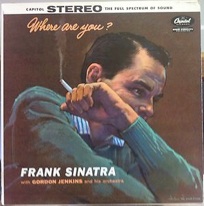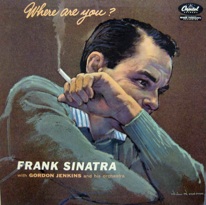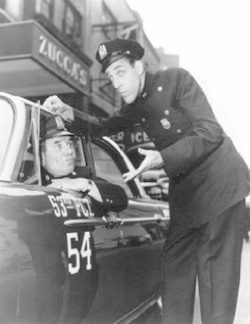Where Are You - Mono/Stereo Variations




(Note: all sample clips mirror the 90-second, free clips available via iTunes, audible by clicking “VIEW” in the iTunes link, above right. Please e-mail if the iTunes clips change.)
“Mono Leaves”
(See iTunes link above for correlating samples. Click on VIEW.)
Thanks to SHF member MMM for reminding me that there is an edit in the side two opener, “Autumn Leaves,” that is not present in the stereo version, be it LP, CD, or open reel. This is very subtle, as far as edits go, and I’m sure many fans would go their entire lives and never notice that there is a difference between the mono and stereo versions.
To make it easy to hear where things “part company,” I have taken the stereo version (original mix, from the MFSL box) and summed it to mono, then bumped it over to the LEFT CHANNEL only, while the original mono mix (courtesy stevelucille) appears in the RIGHT CHANNEL only.
1. The two versions start identically, from the same take.
-
2.At the last bass note just prior to “the summer kisses,” the stereo continues on, apparently unedited, while the mono has an intercut to another take.
Click here to listen: AutumnLeavesPartCompany.mp3
The edit appears to be in the mono mix, not the stereo, as the bass pizzicato notes, which are all on the downbeats, appear to “jump” just slightly on the mono version as compared to the stereo version.
From that point on, there are occasional pairs of words or little phrases that are identical between the two versions, but I think that only happens because the singer and conductor happened to sing/play a given line with identical phrasing on more than one take. For instance, on the sample above, you may have noticed that the phrasing was different after the splice occurred, but then two words, “to hold,” were precisely together again, but it’s just because that phrase happened to be performed the same way on two takes, as immediately after that, the differences continue. Some phrases, though, are surprisingly similar, although never for long. Listen to these three brief comparisons:
SinceYouWentAway.mp3 AndSoonRedux.mp3 ButIMixs.mp3
Now the question remains as to why the splices were made in the mono version, and I think it was because Sinatra, Gilmore, Jenkins, or some combination thereof, were not satisfied with the cohesion within the rubato sections of this tune, which are quite difficult to hold together in absolute terms. To be more specific, I believe that this boils down to the old maxim, “Blame the horn section.” (Since I was a French Horn major in college, I can say this.) On the phrase, “Since you went away, the days grow long,” Frank and the horns (and strings, to be fair) were supposed to move en masse. Listen to how they interact by clicking here: SinceYouWentAway-Horns.mp3 You will hear the stereo version (summed to mono) three times in a row, followed by the mono version one time. Clearly, the mono version has the group moving in time with the singer, where the stereo version was sloppy by comparison.
It’s interesting to note that “Autumn Leaves” was the fourth and final tune recorded on this day, April 10, 1957. I have worked on contracted orchestral sessions, and if things in the fifties were at all like they were in the eighties and nineties when I was in that business, the clock was king, and if that session was scheduled to run from, let’s say, 1 PM to 4 PM, come 4 PM it was “show over.” It may be that one more take was desired, but time simply ran out, so splicing was required to get the fine details that Voyle Gilmore et al were looking for. Again, we’ll likely never know, but clearly, Sinatra, Jenkins, and producer Voyle Gilmore were working on a very high artistic level.
“Maybe You’ll Be Stereo”
(See iTunes link above for correlating samples. Click on VIEW.)
Now here’s something odd! There is a splice and very short replaced section in the stereo mix of “Maybe You’ll Be There” that is not in the mono mix, made even odder by the fact that it is on the 1957 two-track stereo tape, the long-used 1959 stereo LP mix, and the CD remixes, indicating that the splice is apparently made directly on the three-track session tapes, not on a stereo mixdown tape. Furthermore, I’m quite perplexed as to why a splice was made.
The insert appears to cover only one vocal phrase, occurring around 2:04. It’s quite obvious, actually. The first violinist has a jump upward of a musical major 6th, and the splice is right between the lower note and the higher note. Here it is three times in quick succession, then in context, taken from the 1957 ZD-17 reel, the first stereo mix of this song: MaybeYouSplicex3-Context.mp3
Next, listen to the original mono D1 pressing, which has no splice: MaybeYouD1Only.mp3.
Now, listen to a mix that has the mono version on the left, with the stereo mix folded down in the right channel only: MaybeYouD1-ZD28.mp3
The only vocal phrase that is affected is the line, “Someday if all my prayers are answered.” I don’t know why it’s like that, but it is!




“’I Cover the Waterfront,’ Where Are You?”
I Cover the Waterfront, being the only mono-only track from this album, is a sort of “odd man out” where this collection is concerned. It has appeared on mono LPs, five stereo LP issues (four of them containing all twelve album cuts), and each of the CD issues, but...how has it been handled?
Click the photo of our heroes, Toody and Muldoon, to hear:
1. A D10 twelve o’clock rainbow pressing, courtesy stevelucille - True mono;
2. The 1982 MFSL LP - ?? Digitally mastered ??, with a mono tape playing on a stereo machine;
3. The green-label SN-series LP from stevelucille - bad fake stereo;
4. The 1988 Japanese CD from MMM - True mono;
5. The 1991 Larry Walsh CD - mono tape on a stereo machine;
6. The 1998 Bob Norberg CD - fake stereo, with a dash of distortion in the left channel for good measure;
7. The 1998 British box set CD - mono tape on a stereo machine, with the left channel 1.3 dB louder than the right, perhaps intentionally to create a mild “stereo effect,” with a dropout along the way.
Comments:
3 is horrible; 6 is bad; 4 has so-so tone; 7 is quite compressed. I don’t think any of the CDs sound as good as they could. MFSL is the best of the lot, in my opinion.
Update 2/23/10: I’ve checked the 1984 UK LP, and it is true mono, but with tone that is not as nice as the MFSL.
Update 9/26/14: The c. 1975 Dutch LP, i.e., “The Frank Sinatra Story, Volume 6,” is fake stereo, but sums to mono very well.
Update 2/26/15: The 1984 Dutch LP is true mono.


